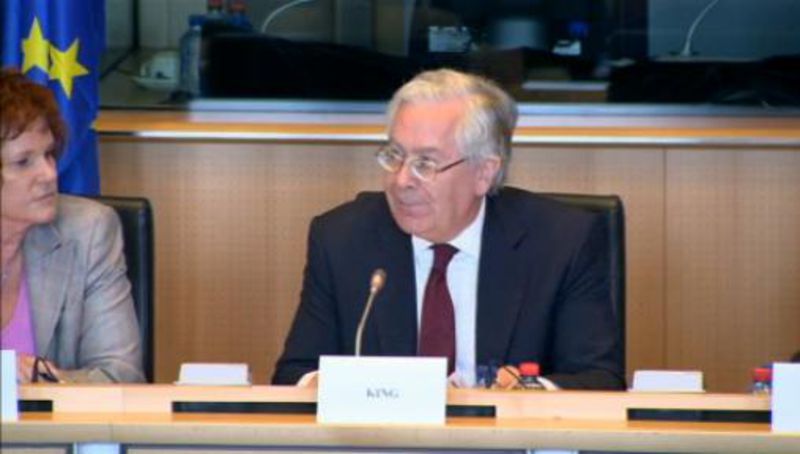Georgi Angelov: GDP is not a good indicator but is the only one so far
Adelina Marini, September 16, 2009
 The European Commission has presented last week its proposal for enlargement of the scale of the GDP as an indicator for the status of the economy. euinside is publishing herewith the opinion of the senior economic analyst from the Open Society institute Mr. Georgi Angelov:
The European Commission has presented last week its proposal for enlargement of the scale of the GDP as an indicator for the status of the economy. euinside is publishing herewith the opinion of the senior economic analyst from the Open Society institute Mr. Georgi Angelov:
euinside: How would you comment the idea of the Commission to extend the scale of the GDP to include other indicators?
GEORGI ANGELOV: In fact there are many such ideas and the French government has assigned a working group with the task to prepare a report on the future of measurement of the economic indicators. The issue cannot be solved that easy with signatures or a change, because this is like in a family - there is not just a single indicator that measures the prosperity of that family. The income is very important, the debts, the environment - whether that family lives in the centre of Sofia, breathing polluted area or lives in the mountain. In other words there are many indicators that show different things and they cannot be replaced by a single indicator that will show everything.
euinside: In the communication of the Commission is written exactly this - that the GDP will be supplemented by a pilot ecological indicator that will measure the climate change and the energy consumption, the carbon footprint, the generation of waste. To what extent such an indicator could add to the whole picture the GDP gives?
GEORGI ANGELOV: To be honest, there is a big problems with a national measurer because, let's say in Sofia the situation is one and in a village in the Rodopa mountains is totally different. To say that in Bulgaria as a whole the environment is well preserved will be wrong. Compared to France, probably we have more forests and more natural reserves but, on the other hand, in Sofia the situation is exactly the opposite - there is not nature at all, there are no parks, it is very polluted. In this sense, a single indicator for a whole country, I'm not sure if it will be able to reflect the whole variety in the different regions of a country. A think this would be very difficult.
It would be much better if such a measurement is done regionally because it would show more accurately the quality of life in a region and will add to the GDP. It is clear that the incomes in Sofia are higher but the quality of life in terms of clean air and environment is pretty bad. In other places in Bulgaria the situation is vice versa - low incomes but very clean environment. But some indicators can be national. For example the carbon dioxide or similar things. But here it is interesting to find out to what extent such indicators are indicative because they depend on the type of industry and the type of economy of a country. A country where there is only tourism will look very much different than an industrialized country. Bot countries are totally different as types of economy and cannot be compared.
euinside: That is exactly the question - if the ecological indicators are included the developed countries that have already applied measures to improve the environment would look much better because they invest in green technology, isn't that right?
GEORGI ANGELOV: Well, the issue is how these things will be measured because, on the one hand, if we look at the pollution indicator per person then all developing countries would look much better because per person they pollute less than the US or Europe. The richer countries have a higher intensity of cars, air planes and industry. In this regard it is important who will win in this debate because if they ask the developing countries they will say we want to measure per person. But the developed states will say, no, we want to measure an absolute cost. I guess there will be some political implications as many international issues do.
euinside: How about the idea for more accurate reporting of the wealth distribution and the social inequality, is there a possibility to measure such things?
GEORGI ANGELOV: This is a complicated issue because it depends on what we will include, what territory, which countries. If we take Europe as an entity, there will be large disproportions in wealth distribution, because Bulgaria is the poorest country, 10 times poorer than Ireland or Luxembourg. Thus it will show that Europe there is much bigger differentiation between rich and poor. It would be different if we analyse the situation on national level. The Europe will look much better. The same goes for other countries. Of course, if we analyse a country on its own, there will be much less inequalities, especially if compared to a country that is 10 times poorer. The European, in general, avoid to make such comparisons, although this is a European initiative because, given the poverty indicator, in Bulgaria we should all be considered poor.
euinside: Does it matter what we analyse because in the document the Commission says that the education, healthcare, the access to services, the infrastructure and the houses should also be included in the analysis?
GEORGI ANGELOV: By the way this would be very important if it happens, especially regarding the education because this is one of the largest problems. Beside some international indexes which are an attempt to make any comparisons, in fact it is very hard to see what the quality of education is in different countries. So, if such a statistics is introduced, it might help a lot to see the development of education and to see which countries are doing better or worse. But here there is a very big problem because how can we measure the quality of education in countries with different languages, with different alphabets, different systems? Nevertheless, it is very important the efforts in this direction to go ahead because, in the end of the day, beside the short-term indicators like wages, incomes, GDP, there are long-term indicators which might be even more important, like infrastructure, education, quality of life, environment because they will determine the development of a country in 10-20 years ahead.
euinside: This is very interesting because if we take the education what are we supposed to measure? Some results or the education system itself?
GEORGI ANGELOV: Generally, the idea is to measure the extent to which children can read, write, whether they understand science. Further in the education system the situation becomes more complex what exactly do we measure and how are we going to define an international standardization. In other words, we in Bulgaria can measure the results of some tests because we have a common education system but how can we compare to the Germans or the Finnish? And with universities the situation becomes deem. That is why there is no international quality classification.
euinside: But shouldn't we analyse the impact the education has on economy - what we actually miss a lot - to produce people that are useful for the economy or the opposite - we don't have people to satisfy the needs of the economy?
GEORGI ANGELOV: In general this is the idea. The problem is that there is no way we can directly watch what impact the quality of education has on economy because the economy is influenced by many other things. For example, the judiciary, whether the business environment is good, the monetary system too. In other words, there are many things that have impact on economy and we cannot watch directly only one indicator. That is why we need intermediate indicators to show the connection we cannot measure. Usually when comes to education, we measure the direct results, i.e. whether children have acquired certain abilities at the end of an educational stage. But it is very hard to do that with the higher stages of education but it's worth trying.
euinside: Just to conclude, in fact it comes out that it would be very hard to include new indicators to the GDP in the next couple of years which can give really accurate picture of the development of a country compared to others?
GEORGI ANGELOV: Yes, this is one thing. On the other hand, there is a need of such various and long-term indicators that will supplement the purely financial aspect of the GDP. Because if we again take the example with the family - its income for a month can be very high but this does not mean that in 10 or 20 years that income will be high again or that the family lives healthy life or that the life expectancy will be high, or the level of education. So, there is a need other things to be measured as well without replacing the financial indicators. The way we measure the incomes of a person cannot be replaced by anything else.
euinside: In the end of the day, the whole idea of what the Commission proposes is to get a full picture of the situation which will help the more accurate definition of policies on European and on national level. But I am a skeptic regarding Bulgaria that such a better picture would lead to better policies in the right direction?
GEORGI ANGELOV: To some extent, I am an optimist because in Bulgaria this is exactly what makes sense - if we are put in a contest to see how bad we are - this is what makes politicians to act. Usually, in Bulgaria, the politicians and the intellectual circles tend to think that Bulgaria has some unique things which shouldn't be changed. But if we see ourselves from the perspective of an international comparison where we are put on the last place, this gives a lot of opportunities for action. We've seen this quite often with the business environment indicator. For years local bureaucrats claim that we are the best in the world but after the World bank releases a list, we see that things are not that nice. And this is what turns the push back to the politicians and they manage to do things the bureaucracy stumbled. I think that the comparisons are very important, especially with other countries.
 | © European Union
| © European Union | © European Union
| © European Union | © European Union
| © European Union